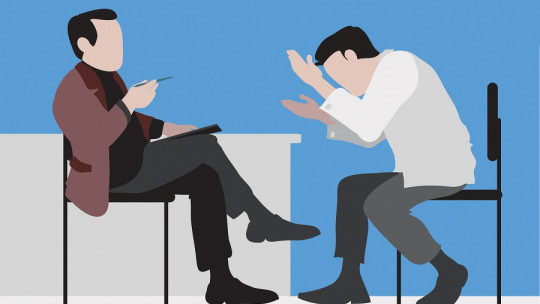
Psychology is a world that arouses the fascination of many people, but at the same time, it is also one of the professional fields most surrounded by myths and other false beliefs about what psychologists do. For this reason, many people do not know that they should go to a psychologist, even if the problem that they could overcome thanks to that professional help has been affecting them for years or even decades.
So that… How do you know if you need to go to a psychologist? Why should you see a psychotherapist? Let’s see it.
The main reasons why you should go to a psychologist
Without us realizing it, on a daily basis, human beings face multiple obstacles more or less successfully, putting into practice emotional management and behavioral self-regulation strategies learned through experience and that often help us overcome problems. challenges that life poses to us. However, sometimes these ways of behaving that we have internalized not only do not help us, but they aggravate our problems and make us enter into a dynamic of self-sabotage.
In some cases, these kinds of experiences give rise to psychological disorders (which have part of their causes in biological predispositions and another in the actions and routines that we have internalized through experience); In others, they generate discomfort that technically does not constitute psychopathology. However, in both situations it is important to seek professional psychological support.

The psychologist is a professional who will help us make all those aware unconscious or semi-conscious problems that we can harbor inside ourselves and reproduce over and over again without realizing it, helping us in the process of overcoming them and making us feel with a greater capacity to adapt physically and emotionally to what happens to us.
Taking this into account, it is time to answer the question: how do I know if I need a psychologist? Let’s see it by reviewing the main reasons why people go to psychotherapy.
1. Mood disorders
Mood disorders are emotional alterations that intensely affect the person’s quality of life and the way they feel at a given moment in their daily life.
These disorders include, among others, depression (states of very intense sadness and hopelessness) and bipolar disorder, characterized by alternating cases of depression and mania that significantly alter the mental health of the person who suffers from them.
Mood disorders are one of the disorders most commonly treated in the consultations of psychology professionals around the world and their treatment is essential to prevent them from becoming chronic and significantly affecting the personal and emotional life of people. who suffers from them. Furthermore, the most severe cases are associated with suicidal ideation.
2. Anxiety disorders
Anxiety disorders are another of the star queries that psychology professionals receive daily and consist of an alteration in a person’s mental health that prevents them from functioning correctly in their daily lives.
This type of disorder is characterized by generating in the person a series of both physical and psychological symptoms based on high levels of anxiety which can range from agitation and sweating to generalized discomfort, suffering, tachycardia, difficulty breathing, dizziness or fainting, in more serious cases.
Some of the most common anxiety disorders are: generalized anxiety disorder, phobias, panic disorder, obsessive-compulsive disorder, and post-traumatic stress disorder.
3. Low self-esteem
Low self-esteem is not in itself a psychological disorder, but it is a significant problem that affects many people. For this reason, it is considered one of the reasons to go to the psychologist, given that in therapy It helps people get rid of those limiting beliefs about the “I” that leads us to self-sabotage.
4. Addictions
Addictions to both chemicals and specific behaviors (for example, gambling) are disorders that They affect the person’s behavior and also their physical integrity, emotional integrity and autonomous decision-making in their daily life.
There are many types of addictions that exist and all of them can very negatively affect both the mental health of the person and their physical health, especially if the consumption of the harmful substance or the addictive behavior is prolonged.
Some of the most common addictions are: addiction to marijuana, cocaine, alcohol or tobacco, gambling, etc.
5. Interpersonal problems
Relationship problems or lack of social skills To interact satisfactorily with other people is also a question that psychologists can answer with absolute success.
Some people may have certain difficulties when it comes to functioning naturally in social environments, and to overcome their problem there are psychology professionals specialized in the interpersonal field.
On the other hand, it may happen that the person does not have problems in all their social relationships in general, but only in certain contexts, such as marriage or the family of which they are a part. In the face of this type of problem, it is also advisable to go to a psychologist, since An intervention can be carried out through couples therapy or family therapy.
6. Work stress and behavioral problems at work
Problems at work that can affect our mental health are a notable source of discomfort and suffering, which over time can be associated with other more serious disorders such as anxiety or stress.
Work stress is increasingly a major problem for many workers around the world and going to a psychology and work stress professional is the best remedy to solve it from the root.
7. Existential crises
Life crises caused by changes in work, family or even migration are also one of the most common reasons why it is necessary to see a psychologist.
These experiences are characterized by a feeling of disorientation or loss of meaning in life and the feeling of being unable to take a certain course.
8. Eating Disorders
Eating problems and disorders are the order of the day in our society and affect increasingly younger people who are influenced by unattainable beauty standards and social pressures of all kinds.
Both anorexia, bulimia, binge eating disorder or vigorexia and any other disorder related to eating behavior, can be treated by a specialized psychologist.
9. Sleep disorders
Healthy sleeping habits are essential to enjoy a healthy life both physically and psychologically; That is why it is so important to sleep the necessary hours daily to rest and maintain consistent and balanced sleep patterns.
Sleep disorders can be caused by multiple reasons, the most common are usually cases of anxiety, stress, or any other psychological disorder, something that a psychologist will be in charge of resolving and identifying professionally.
10. Traumas
Traumatic experiences, such as traffic accidents, natural disasters, or experiences associated with harassment and violence, can leave scars. psychological sequelae that last years or decades if they are not adequately addressed through psychotherapy. That is why it is important to go to the psychologist as soon as possible, to prevent these alterations from taking root in the person’s life and making it difficult for him to be able to evoke those memories without suffering crises.
Are you looking for psychotherapy services?
If you are interested in starting a psychological therapy process, contact us.
In Psychology For We put more than 20 years of experience in the mental health support sector at your service.








